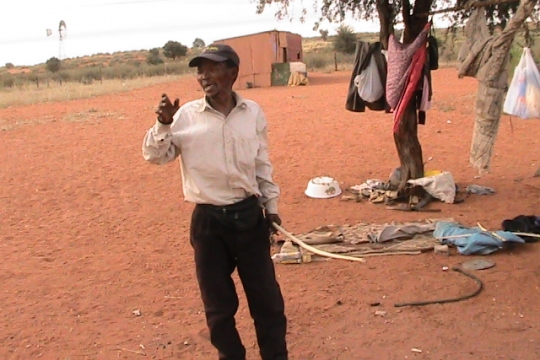Far from being barren wastelands, drier parts of the country like the Kgalagadi are actually treasures for poor rural communities, who are heavily depend on the natural environment as an alternative source of income.
Conservation policy needs to respond accordingly, allowing local communities to have access to the wild resources in a way that will help reduce their poverty, explains Dr Gladman Thondhlana from the Department of Environmental Science at Rhodes University in South Africa.
After studying the way traditional communities such as the San bushmen, living on in the edge of the Kgalagadi Transfrontier Park which straddles the South Africa-Botswana border, use the wild veld, Thondhlana and his colleagues have found that collecting resources such as food, firewood and medicinal plants from the wild provides more ‘in kind’ income to people than it provides a cash income.
‘People living in these rural areas are highly dependent on the natural veld as a source of income,’ says Thondhlana, ‘and it’s particularly true for people living in drier parts of the country, where they can’t support themselves through crop farming.’
The study, done in collaboration with the University of Cape Town’s Environmental Policy Research Unit (EPRU), shows that poorer households are more dependent on these wild-harvested resources than more well-off households.
However this survival strategy is often left out of conservation debates.
The San have historical rights to parts of the park, since their communities have been harvesting medicines, firewood and food, and hunting for game meat here for thousands of years. Existing policies regarding access to environmental resources in the Kgalagadi Transfrontier Park, and other parks, need to reflect this dependence on the natural environment as a livelihood strategy.
‘It’s also important to recognise the rights of local communities to their resources and to compensate for social losses incurred in the past,’ Thondhlana says.
However, Thondhlana warns that access to environmental resources shouldn’t be seen as the cure-all for rural poor living in these near-desert conditions.
‘Environmental income should be complimented by alternative sources of income and innovative programmes, such as improved job opportunities, and getting access to alternative energy sources so that they aren’t so heavily dependent on the environment.’
Thondhlana has focused on this community for years, visiting the area in 2009 and 2011. Some of the lessons gleaned from this research will be published in the journal Ecological Economics shortly, written in collaboration with the EPRU’s Prof Edwin Muchapondwa.
by Leonie Joubert
